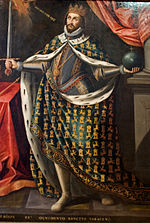Lobera (sword)


The sword Lobera (Spanish la espada lobera "the sword wolf-slayer") was the symbol of power used by Saint Ferdinand III of Castile, instead of the more traditional rod, and so the king will be depicted with orb and sword in hand.
History
Lobera was the sword of Saint Ferdinand III, King of Castile from 1217 and King of León from 1230, He finished the work done by his maternal grandfather Alfonso VIII of Castile and consolidated the Reconquista. In 1231, he permanently united Castile and León. He was considered an exemplary knight in his time. Pope Innocent IV named him "invincible champion of Jesus Christ".
Etymology
Lobera is a Spanish word meaning wolfslayer.[1]
Legend
Don Juan Manuel, Prince of Villena, grandson of King Ferdinand III, wrote in his Libro de los ejemplos del conde Lucanor y de Patronio (1337) ("Book of the examples of Count Lucanor and of Patronio"), that Lobera was the sword of Fernán González of Castile (epic hero from the Poem of Fernán González) and a "sword of great virtue". Don Juan Manuel writes that King Ferdinand III, lying on his deathbed, addressed him in these words: "I can bequeath no heritage to you, but I bestow upon you my sword Lobera, that is of passing worth, and wherewith God has wrought much good to me." .[2]
Description
Lobera, forged in steel, has a blade of 80 cm. and silver ornaments. It is a relic kept in the Capilla Real at the Seville Cathedral.
Notes
- ^ http://buscon.rae.es/draeI/SrvltConsulta?TIPO_BUS=3&LEMA=lobero
- ^ Don Juan Manuel. El Conde Lucanor. Barcelona: Losada, 1997.

